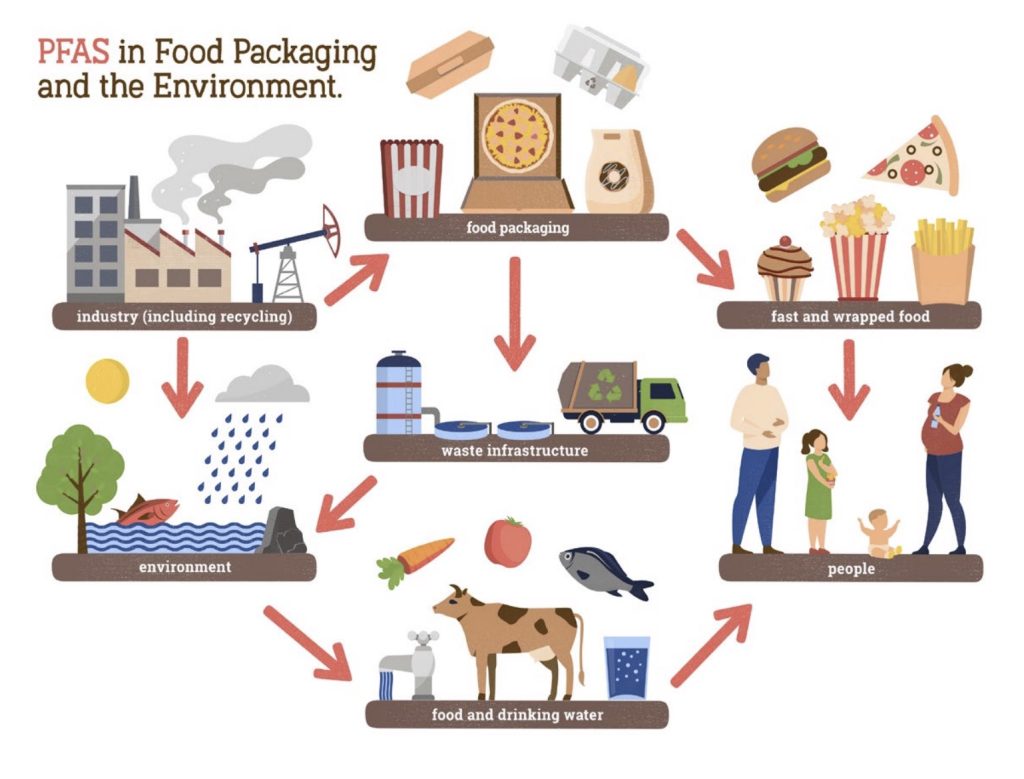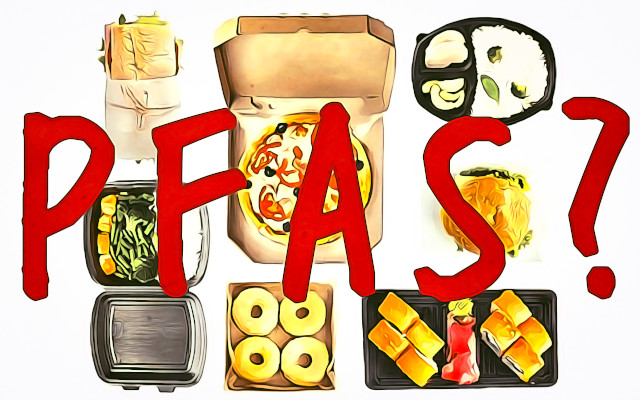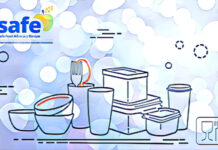The IPEN network (International Pollutants Elimination Network), committed to the elimination of toxic chemicals, analyzed the PFAS contents in 119 samples of food packaging and disposable tableware collected in fast-food restaurants and shops in 17 countries in Asia, Africa, Europe, Latin America and the Caribbean. (1,2)
PFAS in food containers
Perfluoroalkyl substances (PFAS) are still used to make disposable tableware used by fast-food restaurants, food packaging and wrapping, and pans impervious to water and oil.
Toxicity for humans of PFAS is, however, demonstrated by numerous studies. They cause damage to fertility, fetal development and thyroid hormone function. Endocrine interference, carcinogenesis, genotoxicity.

Established toxicity
IARC, the International Agency for Research on Cancer, recently classified two of the best-known PFAS substances, PFOA and PFOS, as ‘carcinogenic to humans’ and ‘possible carcinogenic to humans’ respectively. (3)
The impact on the environment is catastrophic. PFAS have been defined as ‘forever chemicals’ precisely because of their extraordinary resistance to degradation. They thus pollute water and soil forever, to be transferred from them to humans through food. (4)

The IPEN investigation
IPEN analyzed 119 materials in contact with food (MOCA or FCM, Food Contact Materials) taken from the main global and national fast-food chains and in stores in 17 countries.
Sampling of these disposable containers includes:
- paper wrapping for fast-food (e.g. potato chip wrappers),
- bags of popcorn to cook in the microwave,
- disposable plant-based compostable boxes (sugar cane and corn starch) for take-away foods,
- disposable tableware,
- cardboard containers for fatty foods,
- recycled paper packaging for non-fatty foods.
The result of the analyzes
Analyzes laboratory studies have demonstrated, among other things, that
- 54% of the packaging and tableware analyzed (64 samples out of 119) contain PFAS added intentionally and/or derived from contamination (e.g. recycled paper, 4 samples out of 12 tested positive),
- the presence of PFAS also concerns disposable containers and tableware supplied by global fast-food giants (including McDonald’s, KFC, Burger King, Subway, Starbucks and Dunkin’s Donuts),
- the packaging in which PFAS were detected most frequently were microwave popcorn bags (24 out of 28 samples),
- samples containing PFAS come from all 17 countries included in the survey, with a higher prevalence in the Middle East and North Africa,
- the highest concentrations of PFAS concern single-use plant-based molded fiber products (sugar cane or corn starch). Bowls, plates and food containers advertised as biodegradable or compostable,
- FTOH 6:2, among the 21 PFAS identified, is the most widespread and present in the highest concentrations.
McDonald’s double standard
The survey by IPEN exposes the double standard adopted by McDonald’s. Containers distributed in India, Morocco or Argentina are free of PFAS. Toxic chemical substances instead present – as intentionally added – in the FCMs sampled in the Philippines and Jordan.
The ban on use of these toxic substances in food packaging is still rare. Only one out of 27 EU member states (Denmark) and 12 out of 50 US states (California, Colorado, Connecticut, Hawaii, Maryland, Maine, Minnesota, New York, Oregon, Rhode Island, Vermont and Washington).
New PFAS, greater risks
The replacement of older (and studied) PFAS substances with new solutions does not seem like a reassuring measure. (5)
‘Due to the gradual regulation of long-chain PFAS, they have increasingly been replaced with substitutes for short-chain PFAS.
Despite their lower bioaccumulation potential, short-chain PFAS are of growing concern as they are ubiquitous in the environment, even in remote areas.
Short-chain PFAS are even more persistent and mobile in water than long-chain PFAS and therefore may pose greater risks to the environment and human health‘, explains the IPES study.
Recommendations
IPES calls on governments and all operators responsible for the spread of PFAS to ban these substances from food contact materials. He asks fast-food restaurants that have eliminated them to advertise the PFAS-free nature of their containers.
To consumers, IPES reminds that when buying take-away food it is best to bring reusable containers from home. And that it is wrong to dispose of disposable vegetable fiber containers in the organic waste bin, even if proposed as compostable, because these products are often treated with PFAS.
Marta Strinati
Footnotes
(1) Single-Use Food Packaging from 17 Countries Contains PFAS “Forever Chemicals”. IPEN 13.12.23 https://ipen.org/news/single-use-food-packaging-17-countries-contains-pfas-%E2%80%9Cforever-chemicals%E2%80%9D
(2) The survey was conducted by IPEN together with the national organizations AEEFG (Tunisia), CARPIN (Jamaica), CEPHED (Nepal), CZWDA (Zambia), Ecowaste Coalition (Philippines), FECC (Egypt), LPD (Benin) , Green Home (Montenegro), Ayadi (Jordan), IDIS (Philippines), JVE (Cameroon), KWA) (Kuwait), AMSETox (Morocco), OUSANEG (Mexico), Taiwan Watch Institute (Taiwan), Taller Ecologista (Argentina) , Together (Iraq), and Toxics Link (India)
(3) Marta Strinati. PFAS substances are carcinogenic, IARC confirms. GIFT (Great Italian Food Trade).
(4) Marta Strinati, Dario Dongo. PFAS in rainwater and food, a global ban is urgently needed. GIFT (Great Italian Food Trade).
(5) Dario Dongo, Gabriele Sapienza. PFAS, emerging risks on the alternative substance GenX. GIFT (Great Italian Food Trade).
Professional journalist since January 1995, he has worked for newspapers (Il Messaggero, Paese Sera, La Stampa) and periodicals (NumeroUno, Il Salvagente). She is the author of journalistic surveys on food, she has published the book "Reading labels to know what we eat".








